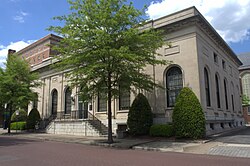Suffolk Historic District is a national historic district located at Suffolk, Virginia. The district encompasses 514 contributing buildings, 3 contributing structures, and 3 contributing objects in Suffolk. The district includes a variety of residential, commercial, governmental, and institutional buildings. They are in a variety of vernacular and popular 19th and 20th century architectural styles including Greek Revival, Queen Anne, and Bungalow. Notable buildings include the Allmond Building (1914), Macedonia A.M.E. Church (c. 1870), National Bank of Suffolk (1914-1920), the Old Post Office (c. 1785), old Nansemond County Courthouse (c. 1837), John Granberry house (c. 1795), Richard Seth Eley House (1878), Jones Building (c. 1925), Suffolk Towers, Virginia Apartments (1918-1920), Causey-Kendrick house (1882), Masonic Hall (1911), Suffolk High School (1922), Jefferson High School (1911), old Methodist Church (1861), St. Paul's Episcopal Church (1895), Suffolk Christian Church (1893), and Congregation of Agudath Achin. Located in the district are the separately listed Phoenix Bank of Nansemond, Professional Building, and Riddick House.[3][4][5][6]
Suffolk Historic District | |
 | |
| Location | Roughly bounded by RR tracks, Hill St., Central Ave., Holladay, Washington, N. Saratoga and Pine Sts.; Roughly along N. Main St., from Constance Rd., to Norfolk and Western RR Tracks; Roughly bounded by N and W RR tracks, County St., and Liberty St., Bank St., Market St., Clay St. and Poplar Sts.; Pinner and Central Ave. and W. Washington St., Suffolk, Virginia |
|---|---|
| Coordinates | 36°43′49″N 76°34′52″W / 36.73028°N 76.58111°W |
| Area | 162.1 acres (65.6 ha) |
| Architectural style | Late 19th And 20th Century Revivals, Bungalow/craftsman, Greek Revival, Queen Anne, Late Victorian |
| NRHP reference No. | 87000631, 99000705 (Boundary Increase), 02000976 (Boundary Increase), 04001295 (Boundary Increase)[1] |
| VLR No. | 133-0072 |
| Significant dates | |
| Added to NRHP | June 22, 1987, June 10, 1999 (Boundary Increase), September 14, 2002 (Boundary Increase), December 3, 2004 (Boundary Increase) |
| Designated VLR | December 9, 1986, September 14, 1998, June 12, 2002, September 8, 2004[2] |
It was added to the National Register of Historic Places in 1987, with boundary increases in 1999, 2002, and 2004.[1]
References
edit- ^ a b "National Register Information System". National Register of Historic Places. National Park Service. July 9, 2010.
- ^ "Virginia Landmarks Register". Virginia Department of Historic Resources. Retrieved March 19, 2013.
- ^ Marc Christian Wagner & Richard Laub (August 1986). "National Register of Historic Places Inventory/Nomination: Suffolk Historic District" (PDF). Virginia Department of Historic Resources. and Accompanying four photo and Accompanying map
- ^ Shirley Maxwell; James C. Massey & Geoffrey B. Henry (April 1998). "National Register of Historic Places Inventory/Nomination: Suffolk Historic District" (PDF). Virginia Department of Historic Resources.
- ^ L.V. Trieschmann; Kristie Baynard & Robin J. Weidlich (March 2002). "National Register of Historic Places Inventory/Nomination: Suffolk Historic District" (PDF). Virginia Department of Historic Resources.
- ^ Ellen Turco (July 2004). "National Register of Historic Places Inventory/Nomination: Suffolk Historic District" (PDF). Virginia Department of Historic Resources.

